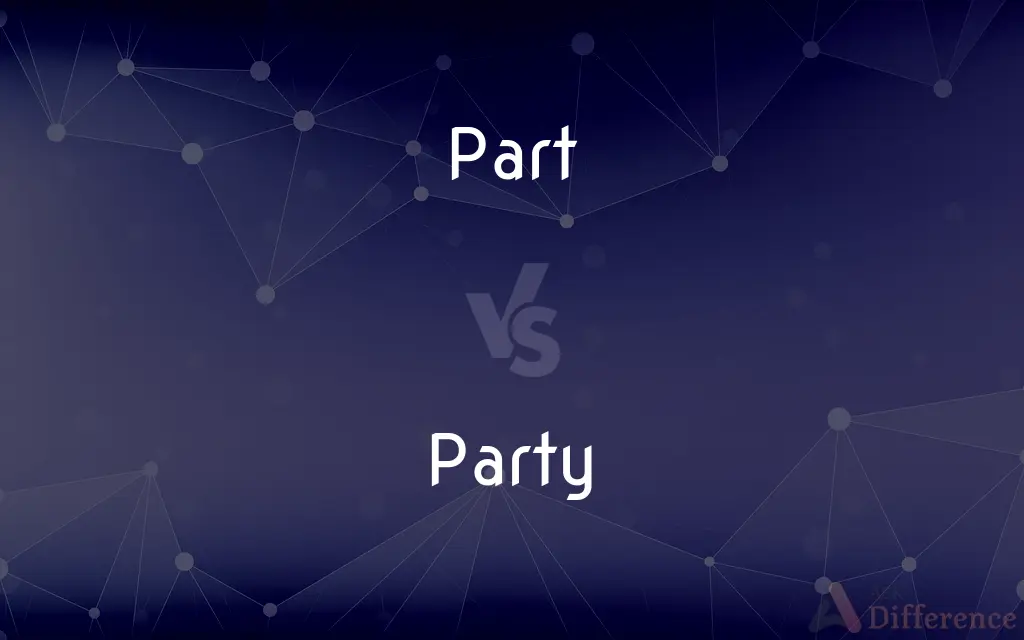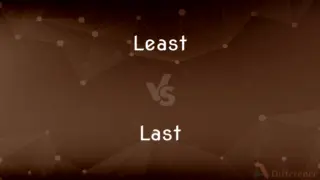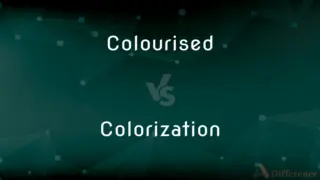Part vs. Party — What's the Difference?
By Tayyaba Rehman & Maham Liaqat — Updated on February 29, 2024
Part refers to a piece or segment of something larger, while party denotes a social gathering or a political group. Part emphasizes components, party focuses on collective human activities or affiliations.

Difference Between Part and Party
Table of Contents
ADVERTISEMENT
Key Differences
Part is often used to signify a piece or fragment of a whole, suggesting division or fragmentation. For instance, when we say, "I only know part of the story," we imply having incomplete information. On the other hand, party is associated with groups of people, either gathered for social enjoyment or organized for political purposes. When someone mentions going to a party, they usually mean attending a social event.
Parts can also serve functional roles within systems or objects, indicating their utility in the broader structure. For example, a car engine has many parts, each essential for the vehicle's operation. Conversely, a political party represents a group of individuals with shared ideologies working towards common political goals, underscoring unity and collaboration rather than mere functional contribution.
Parts are integral to the physical or conceptual makeup of entities, party emphasizes human connections and activities. Buying a part for a broken appliance is about restoration and repair, whereas joining a party is about social engagement or political participation.
"Part" can denote roles or responsibilities individuals hold within larger processes or groups. This usage highlights the segmental nature of contributions. Meanwhile, the term "party" can refer to entities involved in legal agreements or transactions, stressing legal or formal group involvement.
The concept of being "part of something" versus "part of a party" also illustrates a distinction in belonging. The former suggests a componential or fractional relationship, while the latter indicates membership in a social or political group, highlighting different types of association and belonging.
ADVERTISEMENT
Comparison Chart
Definition
A piece or segment of something larger.
A social gathering or a political group.
Context
Mostly used in the context of objects or concepts.
Used in social, political, and legal contexts.
Function
Indicates a component's role within a whole.
Denotes group activities or affiliations.
Association
With physical or conceptual entities.
With human gatherings or organizations.
Example Usage
"A crucial part of the machine is damaged."
"I attended a birthday party last night."
Compare with Definitions
Part
A role or character in a play or movie.
He was cast for the lead part in the new film.
Party
A group of people traveling or working together.
A search party was organized for the missing hiker.
Part
An aspect or feature of something.
Understanding emotions is part of being human.
Party
A social gathering for entertainment.
They threw a party to celebrate the new year.
Part
A piece or segment of a whole.
He played a crucial part in the project's success.
Party
A person or group involved in a legal transaction.
The parties agreed to the terms of the contract.
Part
An element or component of a device.
She ordered a spare part for her laptop.
Party
A political organization.
She is a member of the Green Party.
Part
A fraction or portion of something.
Only a small part of the forest remains untouched.
Party
A person participating in an activity.
He was the life of the party.
Part
A portion, division, piece, or segment of a whole.
Party
A party is a gathering of people who have been invited by a host for the purposes of socializing, conversation, recreation, or as part of a festival or other commemoration or celebration of a special occasion. A party will typically feature food and beverages, and often music and dancing or other forms of entertainment.
Part
Any of several equal portions or fractions that can constitute a whole or into which a whole can be divided
A mixture of two parts flour to one part sugar.
Party
A social gathering especially for pleasure or amusement
A birthday party.
Part
A division of a book or artistic work such as a film
A novel in three parts.
Party
A group of people who have gathered to participate in an activity
A search party.
Part
Often parts A region, area, land, or territory
"Minding your own business is second nature in these parts" (Boston).
Party
A group of soldiers selected for a duty or mission
A raiding party.
Part
Not full or complete; partial
A part owner of the business.
Party
An established political group organized to promote and support its principles and candidates for public office.
Part
Come apart;
The two pieces that we had glued separated
Party
A group of persons collected or gathered together for some particular purpose.
Part
In part; in some degree; not wholly;
I felt partly to blame
He was partially paralyzed
Party
A gathering of usually invited guests for entertainment, fun and socializing.
I'm throwing a huge party for my 21st birthday.
Party
A group of people traveling or attending an event together, or participating in the same activity.
We're expecting a large party from the London office.
Do you have a table available for a party of four?
Party
A group of people gathered together for pleasure;
She joined the party after dinner
Party
A person involved in legal proceedings;
The party of the first part
Party
Have or participate in a party;
The students were partying all night before the exam
Common Curiosities
What is the primary difference between part and party?
Part refers to a segment of something larger, while party indicates a social gathering or a political group.
What does attending a party typically involve?
It involves participating in a social event designed for enjoyment or celebration.
Is a part always physical?
No, part can also refer to non-physical aspects, such as roles or features.
What does it mean to play a part in something?
It means to contribute or have a role in a process or event.
How does part function in a mechanical context?
It denotes a component essential to the operation or structure of a device.
Can an organization be considered a party?
Yes, in political and legal contexts, organizations can be referred to as parties.
Can a single individual be a party?
Yes, in legal contexts, an individual involved in agreements or transactions is considered a party.
Can part and party be used interchangeably?
No, they have distinct meanings and are used in different contexts.
How are parts and parties related to belonging?
Parts indicate belonging to a whole as components, while parties suggest belonging to groups with shared purposes.
What distinguishes a part from a portion?
While similar, a portion is often used to denote a part allocated to someone or something, especially in the context of food or shares.
How does one become part of a party?
By joining a social gathering or becoming a member of a political group.
Can something be part of a party?
Typically, no. "Part" refers to components of wholes, while "party" refers to groups of people.
What is a political party?
It's a group of individuals with shared ideologies aiming to influence or control government policy and actions.
What role do parts play in repairs?
Parts are often replaced or fixed in the context of repairing objects to restore functionality.
How can a party affect an individual’s social life?
Attending parties can enhance social connections and provide entertainment and relaxation.
Share Your Discovery

Previous Comparison
Least vs. Last
Next Comparison
Colourised vs. ColorizationAuthor Spotlight
Written by
Tayyaba RehmanTayyaba Rehman is a distinguished writer, currently serving as a primary contributor to askdifference.com. As a researcher in semantics and etymology, Tayyaba's passion for the complexity of languages and their distinctions has found a perfect home on the platform. Tayyaba delves into the intricacies of language, distinguishing between commonly confused words and phrases, thereby providing clarity for readers worldwide.
Co-written by
Maham Liaqat














































